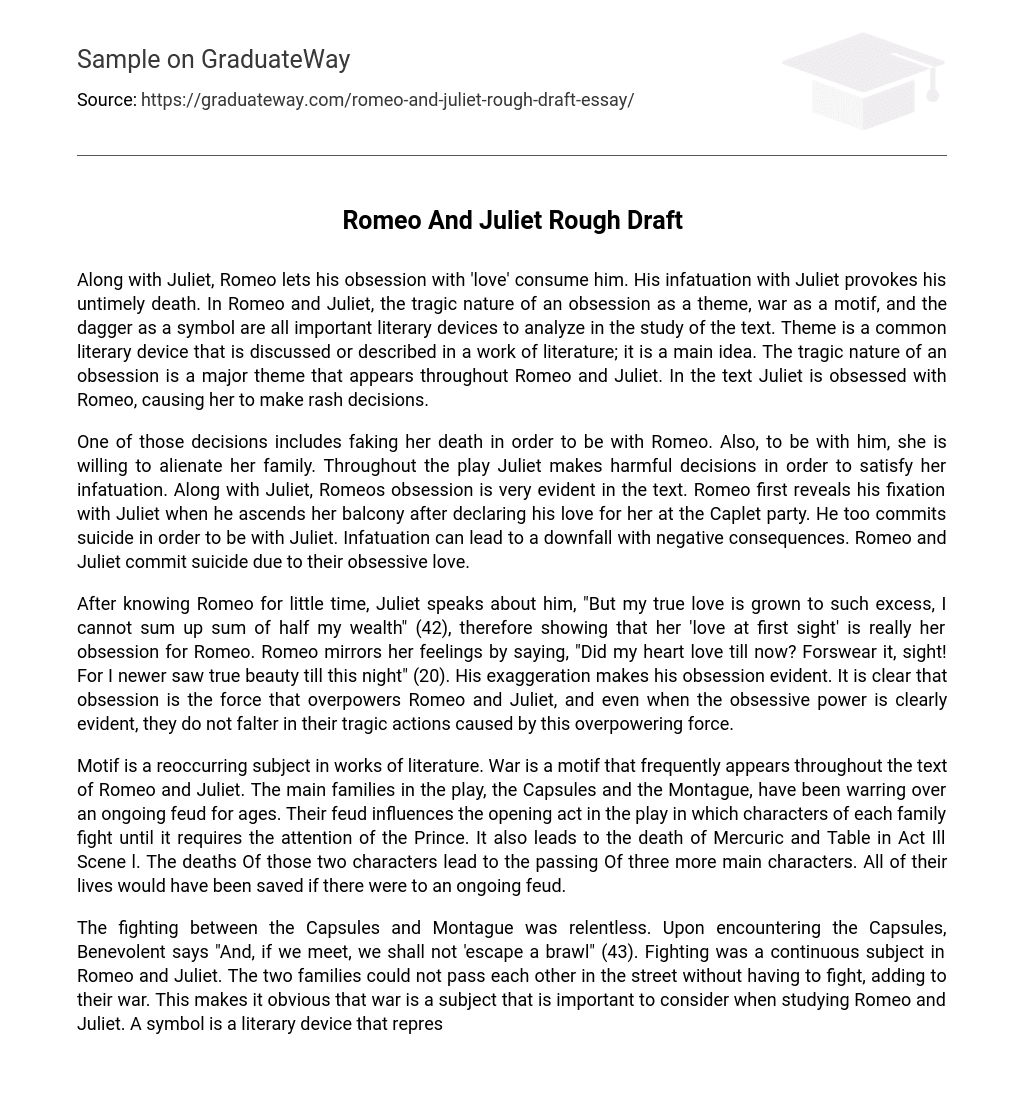Along with Juliet, Romeo lets his obsession with ‘love’ consume him. His infatuation with Juliet provokes his untimely death. In Romeo and Juliet, the tragic nature of an obsession as a theme, war as a motif, and the dagger as a symbol are all important literary devices to analyze in the study of the text. Theme is a common literary device that is discussed or described in a work of literature; it is a main idea. The tragic nature of an obsession is a major theme that appears throughout Romeo and Juliet. In the text Juliet is obsessed with Romeo, causing her to make rash decisions.
One of those decisions includes faking her death in order to be with Romeo. Also, to be with him, she is willing to alienate her family. Throughout the play Juliet makes harmful decisions in order to satisfy her infatuation. Along with Juliet, Romeos obsession is very evident in the text. Romeo first reveals his fixation with Juliet when he ascends her balcony after declaring his love for her at the Caplet party. He too commits suicide in order to be with Juliet. Infatuation can lead to a downfall with negative consequences. Romeo and Juliet commit suicide due to their obsessive love.
After knowing Romeo for little time, Juliet speaks about him, “But my true love is grown to such excess, I cannot sum up sum of half my wealth” (42), therefore showing that her ‘love at first sight’ is really her obsession for Romeo. Romeo mirrors her feelings by saying, “Did my heart love till now? Forswear it, sight! For I newer saw true beauty till this night” (20). His exaggeration makes his obsession evident. It is clear that obsession is the force that overpowers Romeo and Juliet, and even when the obsessive power is clearly evident, they do not falter in their tragic actions caused by this overpowering force.
Motif is a reoccurring subject in works of literature. War is a motif that frequently appears throughout the text of Romeo and Juliet. The main families in the play, the Capsules and the Montague, have been warring over an ongoing feud for ages. Their feud influences the opening act in the play in which characters of each family fight until it requires the attention of the Prince. It also leads to the death of Mercuric and Table in Act Ill Scene l. The deaths Of those two characters lead to the passing Of three more main characters. All of their lives would have been saved if there were to an ongoing feud.
The fighting between the Capsules and Montague was relentless. Upon encountering the Capsules, Benevolent says “And, if we meet, we shall not ‘escape a brawl” (43). Fighting was a continuous subject in Romeo and Juliet. The two families could not pass each other in the street without having to fight, adding to their war. This makes it obvious that war is a subject that is important to consider when studying Romeo and Juliet. A symbol is a literary device that represents a larger meaning. In Romeo and Juliet the dagger is a reoccurring symbol. When Juliet ends her life, she ends it with the dagger.
The dagger is a symbol of death and violence that appears multiple times throughout the text. The first time it appears in the play is in Act Ill Scene Ill as Romeo threatens to kill himself. In Friar Laurence cell he says “In what vile part of the anatomy doth my name lodge? Tell me, that may sack the hateful mansion” (56) as he draws his sword. The next time it appears is before Juliet takes the sleeping potion. As she is second guessing her decision and holding the dagger she says, “What if this mixture do not work at all? Shall I be married then to-morrow morning?
No, no: this shall forbid it. Lie thou there” (73) and she lays the dagger down. The final time the dagger makes an appearance is in the last scene Of the play. Juliet says “O happy dagger! This is thy sheath” (88) as she drives the dagger into her chest. In every appearance the dagger makes, it represents violence and death. Ultimately, the dagger is a symbol in Romeo and Juliet that presents itself often and always as a sign of death. All in all, the main characters of Romeo and Juliet had weak spots they were oblivious to, which resulted in ruination.





